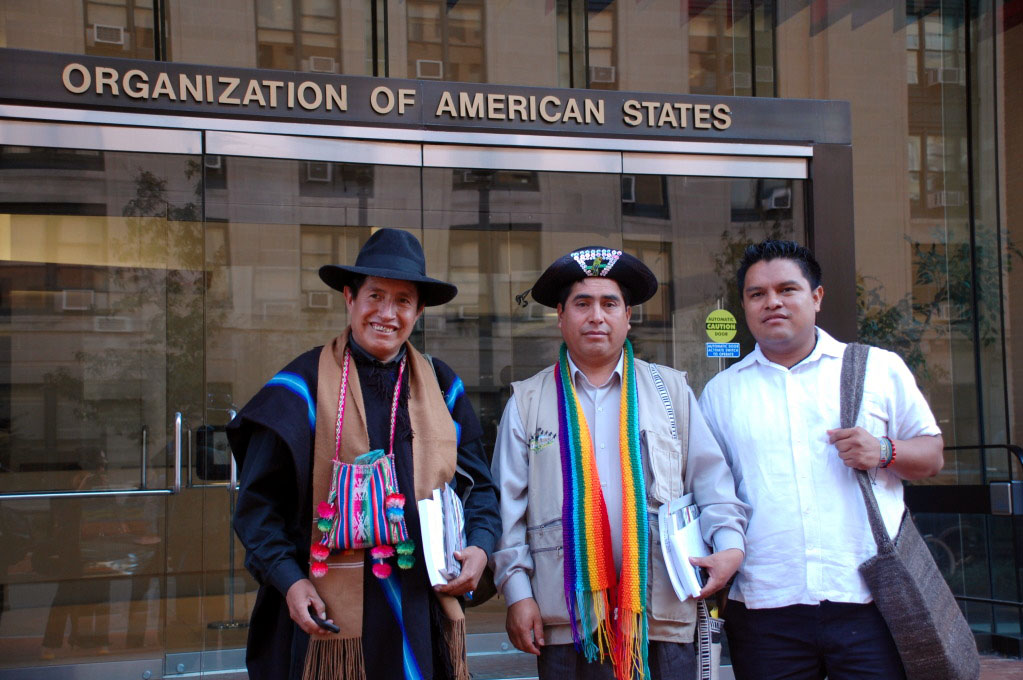The expansion of mining operations in the Andean Region of South America are threatening the very existence of several indigenous communities in Peru, Columbia and Bolivia.
 The Indian Law Resource Center is helping indigenous leaders from these communities raise international awareness about the devastating impacts on indigenous peoples caused by mining.
The Indian Law Resource Center is helping indigenous leaders from these communities raise international awareness about the devastating impacts on indigenous peoples caused by mining.
In late October, indigenous leaders traveled to Washington, D.C. for the 140th Period of Sessions at the Inter‑American Commission on Human Rights. The Commission is a body of the Organization of American States empowered to consider cases of human rights violations and make recommendations for remedying violations. At the thematic hearing, the leaders shared testimony about their communities’ struggles on the front lines of the fight against mining development.
Peru
More than 40 communities with at least 500 families have been devastated by pollution from the Caudalosa mine after a dam near Peru’s Escalera River collapsed last June. The dam’s failure sent over 500 tons of hazardous waste into the River and its tributaries. The poisoning of these waters has threatened the existence of the communities who depend on them to sustain their main economic activities: farming and fishing. No environmental clean‑up has occurred despite numerous calls for action from community leaders.
At the thematic hearing, Carlos Candiotti, General Secretary of the Committee for Environmental Inspection of the Province of Angaraes (Huancavelica) explained how the situation is a violation of the communities’ human rights. “The right to water is considered a human right. It is not being respected or cared for, and it is a basic element for our survival. We want Peru to respect these rights," said Candiotti.
The Kechua People of Hunacavelica have called on the government of Peru to address these grave human rights violations and remedy the environmental damage. This disaster occurred because of inadequate environmental standards – it is a tragedy that could have been prevented.
Bolivia
In April 2009, the multinational Korea Resource Corporation made an agreement with a Bolivian state-owned company to exploit new copper deposits through an open-pit mining operation for a period of 30 years. The agreement was made without consulting the Ayamara Pakajaqi indigenous people who own the affected territory or even conducting an environmental impact assessment.
Currently this project is in the exploration phase, with mining scheduled to begin in 2011, but the direct and indirect impacts on the Aymara Pakajaqi indigenous communities have already been extreme. Water in the neighboring river is being diverted for mining, reducing the flow to about 600 people downriver whose lives and livelihoods are based on the land and water. The water that does come to the community has become contaminated and is harming the community’s crops and livestock.
Rafael Quispe Flores, leader of the Extractive Industries Commission of the National Council of the Ayllus and Markas of Qullasuyu, explained to the Inter-American Commission that Bolivia allowed this mining operation to bypass existing domestic laws establishing environmental and social safeguards for extractive industry projects. In particular, no consultations were carried out with the project-affected communities. The government agency that should have been in charge of the consultation process was not yet functioning. In fact, Bolivia has not yet created this agency, nor has it allocated the necessary resources to carry out its mandate.
Colombia
The U.S.-owned Muriel Mining Company has built a mine within the sacred territory of the Embera people, on the border of the Choco and Antioquia departments in Colombia. This was done without any consultation with the indigenous community.
“The community was not sufficiently informed about the project, the consequences and its impact,” said Javier Sanches Reyes of theOrganización Nacional Indígena de Colombia (ONIC). “Since the beginning they have been opposed to the execution of this project by this company.”
According to ONIC, there have been forced displacements, the territory has been militarized, and leaders who have spoken out about these human rights violations have become targets of harassment. Specifically, the right to free, prior and informed consent has been violated, as well as the right to territory and the right to life.
The Indian Law Resource Center and its partners ‑ Confederación Andina de Organizaciones Indígenas Perú (CAOI), ONIC, Centro de Estudios Aplicados a los Derechos Económicos, Sociales y Culturales (CEADESC), and Comité de Fiscalización del Medio Ambiente de la Provincia de Angaraes, Peru - presented this critical testimony, legal analysis and made recommendations to the Inter‑American Commission of Human Rights.
Since 2007, the Center has worked in collaboration with CAOI to raise awareness about the complexities and the array of human rights violations caused by multilateral development banks, governments and corporations within the context of extractive industries, infrastructure and energy projects affecting indigenous lands and natural resources. The Center helped the indigenous leaders prepare their testimonies and scheduled meetings between the leaders and influential officials and human rights advocates to discuss the situations confronting their communities. The delegation's visit is part of a larger strategy to influence and improve governmental and multilateral development bank safeguard policies, implement the UN Declaration on the Rights of Indigenous Peoples, and support regional leadership to improve the human rights condition of indigenous peoples in the Americas.
Additional Resources:
